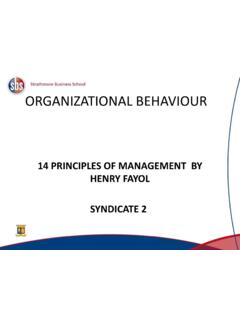Transcription of Syndicate Group 7 - Strathmore University
1 Chester Barnard and The Systems Theory By Syndicate Group 7 Outline Who is Chester Barnard? What is the Systems Theory? The 3 Principal Elements of a Cooperative System Individual Willingness To Serve Communication The Organisation s Common Purpose The Functions of The Executive Critique of The System Theory Who is Chester Barnard? Chester Irving Barnard (November 7, 1886 June 7, 1961) was a telecommunications executive and author of Functions of the Executive, an influential 20th century management book. He looked at organizations as systems of cooperation of human activity, and was worried about the fact that they are typically rather short-lived. According to Chester Barnard, this happens because organizations do not meet the two criteria necessary for survival: efficiency and effectiveness. Efficiency of an organization as the degree to which that organization is able to satisfy the motives of the individuals.
2 Effectiveness- being able to accomplish the explicit goals. What Is The Systems Theory Barnard characterized all organizations as cooperative systems- integrating the contributions of individual participants directed toward a common purpose. Willingness to serve, common purpose and communication are the principal elements in an organization (or cooperative system). He felt that an organization did not exist if these three elements were not present and working interdependently. Barnard viewed communication as an energizing force that bridges the natural gap between the individual s willingness to serve and the organization s common purpose. The 3 Principal Elements of a Cooperative System Individual s Willingness to Serve Communication The Organisation s Common Purpose Individual s Willingness to Serve In the theory of incentives, he sees two ways of convincing subordinates to cooperate: tangible incentives and persuasion.
3 He gives great importance to persuasion, much more than to economic incentives. He described the following incentives: Material inducements such as money Opportunities for distinction Prestige Personal Power Desirable physical conditions of work The Organisation s Common Purpose Clearly defining the purpose of the organization. Clearly communicate goals. Goals are imposed from above but willingness comes from the bottom up. Theory of Authority- Authority is only realized when those below accept and comply with that authority. Communication Maintaining the lines of communication to ensure an even flow of information. Both the individual and an organization s common purpose are seen in the context of a communication system that should be based on some essential rules: The channels of communication should be definite Everyone should know of the channels of communication Everyone should have access to the formal channels of communication Lines of communication should be as short and as direct as possible Competence of persons serving as communication centers should be adequate Therefore The Functions of The Executive To secure the essential services from individuals To formulate the organizational purpose and objectives To establish and maintain a system of communication If an organization satisfies the motives of its participants (efficiency) + attains its explicit goals (effectiveness) cooperation among them will last and organization will not be short lived.
4 Critique Of The System Theory Did not mention measuring employee performance management. Did not consider the external environment and stakeholders such as- customers, economy, government, etc. Did not mention individual growth, development and training of employees and how this can impact motivation and productivity. Did not mention delegation and placed too much emphasis on authority. The End Questions?










